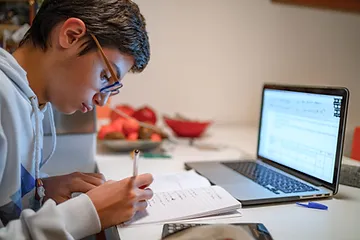The transition from elementary to middle school is the most significant change in K–12 schoolings. Students are moving from a room with 1 teacher and maybe 20ish classmates to multiple teachers with different teaching styles, new peers in various classes, and higher expectations of individual responsibility.
In order to understand why this transition is so pivotal, we must understand the way the brain processes information for learning as it develops. In the elementary years, the learning tasks are centered around memorization for academics and social skills. Because the brain is so occupied with creating these patterns and routines there is relatively little room for the more rigorous concepts in middle school. Essentially the elementary years are in preparation for the rigors of middle school.
The transition from elementary to the middle along with the continual maturing of the brain allows for a higher emphasis to be placed on inferential thinking and a lessened focus on the routine memory work. Chemical changes and new neuron pathways support the short and long-term memory needed for success in middle school.

In short, by middle school, your child’s brain will be ready to tackle material on a deeper level. On average these students are ready for middle, but it can not be assumed that all are ready for new challenges, and as such teachers must be vigilant to ensure the deeper content is communicated in an effective and engaging manner for the students.
There are 3 main areas of concern for parents and students with the middle school transition: academic success, logical concerns, and social acceptance. Here we dive in on the academic concerns, but be sure to check out our piece on how to navigate the social hurdles of middle school in our May article.

For your student, thinking of middle school can have a series of concerns running on repeat in their head. Will the classes be too challenging? Will there be an excessive amount of homework? Are the teachers tough on grading? What happens if they turn in work late?
Rest assured it is quite normal for your student to have some growing pains as they transition from elementary to middle school and their grades may drop with the move to middle school. They are learning to navigate a whole new world complete with emerging hormones, physical changes, social standing, and add to that an entirely new set of academic expectations and it should not be surprising that their grades may dip. However, most students with support, flip the dip and find their groove.
Some tips to help ease academic concerns:
- If your child appears to be overwhelmed, reassure them that they will be able to handle the new challenges with time and practice.
- Help your student to develop time management skills. Create a schedule for study time, breaks, chores, and so on.
- Work with your student to develop an organizational system, such as a planner or a backpack with plenty of storage. Anxiety can be greatly reduced by feeling prepared with supplies and materials.
- Refrain from overreacting to grades. Making sure your child understands how to meet the demands of the new school is critical in the first few weeks.
- Stay aware of your child's schoolwork. CFCA utilizes Gradelink so that parents can see their child's progress in a class at any time.
- Allow your student to work independently while still providing them with enough support to give them confidence.
- Encourage them to discuss problems and solutions with teachers on their own, but be prepared to step in and assist if necessary.
- Finally, the best way to assist your child with this transition is to maintain a positive attitude toward middle school. When they express concerns or frustrations about their academic performance, empathize with them. Assure them that they will grow more at ease and confident over time. Remind your child that the school and teachers want them to succeed and that they have what it takes to succeed.
Many students new to middle school are fearful of talking to their teachers. They worry that their teachers may view them as “dumb” or that with a bad grade they will see them as a bad student. Studies show that having a strong support system in place at the home will help students to overcome these hurdles. As a parent, supporting your student and modeling positive attitudes toward the school and teachers will lead to confident students that trust their teachers and become invested in their own success. The most successful students have their parents alongside offering support although it is a delicate balancing act as a parent to support, but not step in to fight their battles.
Becoming a successful middle school student both neurologically and socially does not happen on the first day. Instead, this is a gradual process with a learning curve.
Here we offer some perspectives and advice from those in the field to help ease this pivotal shift: a teacher, a seasoned parent or two, and a few current middle school students to help ease the transition.
Challenges noted and experienced:
- Amber Holland, a veteran middle school teacher of 17 years had this to share. “The biggest challenge that I noticed for sixth graders is time management and responsibility. Parents are used to getting weekly reminders from elementary school teachers regarding their child’s academic and behavioral performance. Middle school teachers will have an average of approximately 120 students on all of the rosters, so it can prove quite difficult for a middle school teacher to contact every student's parent weekly. The lack of time and the increase in student/class numbers results in students being reminded verbally. However students do have access to their grades and assignments online, but again they aren’t used to being the ones navigating those platforms. Many students and parents are surprised when they go to a C, D, or F in a class or subject area that in the past they had always gotten A’s or B’s and then they don’t know how to make it up or catch up.
- Krista Judd Blackburn, mom to a 7th grader, shares her thoughts on Ella’s transition from 5th to 6th grade “For Ella, the transition from elementary to middle school came without an understanding of the importance of doing all of her work, even if she missed a day of school. I had to remind her that missed work from an absence still had to be completed in addition to current work.
- Mandy Wiggins mother to Allie a current 8th grader at CFCA also shared her thoughts “The biggest challenge was adjusting to from having ONE teacher to having multiple teachers and each had very different teaching styles and expectations - stressful for her bc what was good for one wasn’t necessarily what another expected or allowed
- Dr. Katherine Spradley notes the 3 big areas of struggle when her children transitioned to middle school. “Study transition, time management, self-management.
- Keely Holland, a current 7th grader, shared her struggles. “The hardest part was probably being online and not getting the main things from 5th grade that I needed for 6th”.
- Anthony McAlister, also a 7th grader notes, “It is a big jump cause in 5th you just had classes but when you get to 6th you start to have electives”.
- Nev Spradley, new to middle school as a current 6th grader, shared her challenges. “Switching classes and using a planner and google classroom and turning stuff in.”
Suggestions and advice from the teacher, parents, and students:
- The teacher Ms. Holland encourages the following. “Self-reflection and self-monitoring of progress are essential to middle schoolers, as they are going from 1-2 teachers-of-record to 6-7 teachers-of record; this can be overlaid if not managed from the beginning as teacher and class expectations increase with each day, week, month, and future school-grade years. Check your grading system at least once to twice a week (preferably when grades are posted - typically on Monday and Friday each week) and write down any assignments that are marked missing or with a 0 - even if you “think” you already turned them into the teacher either on-time or late. Then, have the student inquire about these with their teacher after class or by email; this shows initiative and responsibility and encourages self-reflection and personal progress monitoring.
- Mom, Krista offers this advice. “Pay attention and be super involved. Communicate regularly with teachers and your student. Check grades in PowerSchool and sit with them while they do homework. They often won’t ask for help, but this gives you the opportunity to be very present and involved. You can see the struggle when it starts/happens and help without them having to ask”
- Mandy also shares her number one piece of advice. “I think Had I known how crazy it was going to be I would have started kind of simple time management activities for them to work through the summer prior to entering middle school, have them start using a planner to keep track of things, and also start learning how to take notes.”
- Dr. Spradley wants the kids to know: “It is ok to get help from experts like a guidance counselor
- Challenges are ahead in life and learning to meet challenges head-on now will mean they will be better prepared later.”
- Keely said, “Be sure to ask questions and use well-thought-out responses.”
- Anthony was adamant that you, “come to class prepared every day. Keep all your papers and materials organized. Be willing to work hard and try your best. Ask questions when you do not understand. Don't be afraid of challenges. Do your homework. Do not let projects go until the last minute.”
- Nev’s big tip is to always “use a planner and turn in their work.”
At CFCA, we have well-seasoned teachers that recognize that the first of middle school is a hard switch. They use strategies that the students may have been accustomed to in the past (writing assignments on the board) and as time progresses those practices will be weened until the students are able to manage writing their assignments with verbal cues. The move from 5th to the middle doesn’t have to be fueled with fear and apprehension. At CFCA, you can rest easy knowing that 6th grade comes with a lot of grace, and growth expectations, and is a safe place for your child to mature and even excel academically. Reach out to schedule a tour of our campus. Your prospective student will be invited to sit in on a day of classes and have the opportunity to meet the teachers and make friends for the upcoming year.


